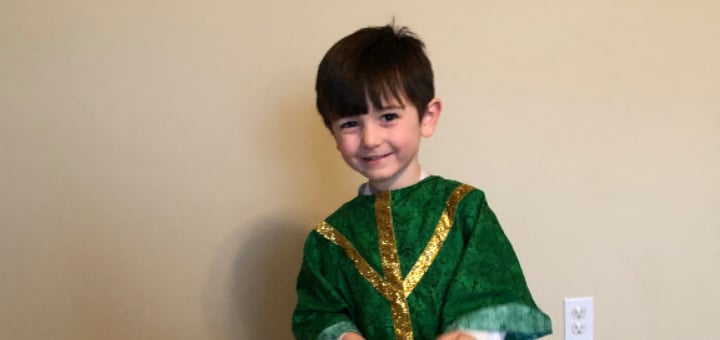
 When I worked as a Director of Religious Education, one of my favorite tasks was substitute teaching with the younger children in my program. Finding opportunities to share the faith with the children was both a challenge, since I spent more than my fair share of time in my office emailing and lesson planning, and a source of profound joy. I know that all the work that I did was toward the salvation of their souls, but it brought me such joy when I could see the fruits of my work, through the grace of God, in the faces of my students.
When I had the chance to teach the younger grades, I would often be shocked by just how much backtracking I had to do in my teaching. I’ve learned that you can take absolutely nothing for granted with your students. You cannot assume that they know anything about the faith. Sometimes you will be pleasantly surprised by the knowledge that they do have, but more often than not, a slight skepticism about the extent of their knowledge of the faith prevents you from becoming overly disappointed.
I remember one particular lesson about heaven. This has always been a hard topic to explain to children, because they take everything so literally. You have to speak abstractly about so many things, because so many students come to class with images in their head of a place in the sky where everyone is see-through and they spend all their time singing church hymns. The class began with one child declaring that he didn’t want to go to heaven because it would be “boring.” I asked him why he thought that should be the case, and he promptly replied that all of our time in heaven would be spent singing and praying. Yeah, if heaven was an eternity of rote prayer (because somehow all of my children seemed to think that we’d just pray Our Fathers and Hail Marys forever) and singing church hymns, I’d be bored there too. But it’s so much more than that.
My students didn’t believe me at first. I told them to close their eyes and imagine the activity or person that makes them happiest. I told them to think about how that happiness makes them feel, and then told that heaven would be a million times better than anything you could have imagined, and then some. Naturally, while this answer excited them, it did not completely satisfy them.
“Will I see my dog in heaven?”
“What about my parents?”
“Will we wear clothes in heaven?” (I believe that this particular question was sparked by the fact that we had recently read the Creation story.)
“Will we be able to dance?”
“Play sports?”
I answered them as best as I could, which was incredibly inadequate, and admitted that to a certain extent, heaven was a mystery. We’ll know what it’s like when we get there. And still the questions continued.
“Will my grandmother be there?”
“Will my friends be there?”
“Will you be there?” (I sure hope so.)
Bombarded by these questions, I laughed and told them that we should pray for everyone who has died so that we’ll see them in heaven. I reassured them that one day they would see their loved ones in heaven after they had died. Jesus would make sure that we would be reacquainted with all those that we love, I told them.
The reaction was immediate- “Jesus will be there too?!”
“Of course,” I told them, “He wouldn’t open the gates of heaven for everyone else, and not go there Himself. Where do you think He went when He ascended?”
“To heaven, but not where we go.”
I was shocked that they had not realized that God would be in heaven with them. I was also shocked that in my explanation of heaven, this fact had not come up sooner. I had just assumed that they already knew. I had been wrong.
This new piece of knowledge brought more joy to these children than I ever thought imaginable. Though we had already spoken about the Eucharist, they did not quite grasp what it might be like to see God. Of course, the Eucharist is just a foreshadowing of the glory of heaven, but what would heaven be like without Jesus?
My students were thrilled at the prospect that Jesus would be with them in heaven, and their questions once again erupted.
“Will we get to talk to Him?”
“Will He play with us?”
“Will He make us say prayers all day?”
“Will He let us have fun?”
As I answered them to the best of my ability, I recalled what Christ had said about children while He was still on earth. I pulled over the Bible and quickly located the passage, passing it to a child to read out loud.
When I worked as a Director of Religious Education, one of my favorite tasks was substitute teaching with the younger children in my program. Finding opportunities to share the faith with the children was both a challenge, since I spent more than my fair share of time in my office emailing and lesson planning, and a source of profound joy. I know that all the work that I did was toward the salvation of their souls, but it brought me such joy when I could see the fruits of my work, through the grace of God, in the faces of my students.
When I had the chance to teach the younger grades, I would often be shocked by just how much backtracking I had to do in my teaching. I’ve learned that you can take absolutely nothing for granted with your students. You cannot assume that they know anything about the faith. Sometimes you will be pleasantly surprised by the knowledge that they do have, but more often than not, a slight skepticism about the extent of their knowledge of the faith prevents you from becoming overly disappointed.
I remember one particular lesson about heaven. This has always been a hard topic to explain to children, because they take everything so literally. You have to speak abstractly about so many things, because so many students come to class with images in their head of a place in the sky where everyone is see-through and they spend all their time singing church hymns. The class began with one child declaring that he didn’t want to go to heaven because it would be “boring.” I asked him why he thought that should be the case, and he promptly replied that all of our time in heaven would be spent singing and praying. Yeah, if heaven was an eternity of rote prayer (because somehow all of my children seemed to think that we’d just pray Our Fathers and Hail Marys forever) and singing church hymns, I’d be bored there too. But it’s so much more than that.
My students didn’t believe me at first. I told them to close their eyes and imagine the activity or person that makes them happiest. I told them to think about how that happiness makes them feel, and then told that heaven would be a million times better than anything you could have imagined, and then some. Naturally, while this answer excited them, it did not completely satisfy them.
“Will I see my dog in heaven?”
“What about my parents?”
“Will we wear clothes in heaven?” (I believe that this particular question was sparked by the fact that we had recently read the Creation story.)
“Will we be able to dance?”
“Play sports?”
I answered them as best as I could, which was incredibly inadequate, and admitted that to a certain extent, heaven was a mystery. We’ll know what it’s like when we get there. And still the questions continued.
“Will my grandmother be there?”
“Will my friends be there?”
“Will you be there?” (I sure hope so.)
Bombarded by these questions, I laughed and told them that we should pray for everyone who has died so that we’ll see them in heaven. I reassured them that one day they would see their loved ones in heaven after they had died. Jesus would make sure that we would be reacquainted with all those that we love, I told them.
The reaction was immediate- “Jesus will be there too?!”
“Of course,” I told them, “He wouldn’t open the gates of heaven for everyone else, and not go there Himself. Where do you think He went when He ascended?”
“To heaven, but not where we go.”
I was shocked that they had not realized that God would be in heaven with them. I was also shocked that in my explanation of heaven, this fact had not come up sooner. I had just assumed that they already knew. I had been wrong.
This new piece of knowledge brought more joy to these children than I ever thought imaginable. Though we had already spoken about the Eucharist, they did not quite grasp what it might be like to see God. Of course, the Eucharist is just a foreshadowing of the glory of heaven, but what would heaven be like without Jesus?
My students were thrilled at the prospect that Jesus would be with them in heaven, and their questions once again erupted.
“Will we get to talk to Him?”
“Will He play with us?”
“Will He make us say prayers all day?”
“Will He let us have fun?”
As I answered them to the best of my ability, I recalled what Christ had said about children while He was still on earth. I pulled over the Bible and quickly located the passage, passing it to a child to read out loud.
At that time the disciples approached Jesus and said, “Who is the greatest in the kingdom of heaven?” He called a child over, placed it in their midst, and said, “Amen, I say to you, unless you turn and become like children, you will not enter the kingdom of heaven. Whoever humbles himself like this child is the greatest in the kingdom of heaven. And whoever receives one child such as this in my name receives me.” (Matthew 18:1-5)The Kingdom of God belongs to children, and as I listened to my students talk about all the things that they wanted to do with Jesus in heaven, I really began to understand that passage. There was something so lighthearted and joyful about their talk. Sure, I don’t know if there will be basketball courts in heaven, or if we’ll be able to play video games with Jesus (two suggestions of my students), but it was obvious that no matter what my students were doing with Jesus, only one thing was really important to them: that they were with Him. And that’s true love. It doesn’t matter what you do, just that you’re together, and as my students dreamed of heaven, it was clear that only one thing mattered to them: eternal life with Jesus Christ. We have a lot to learn from children, even the most un-churched of them. Even though most of these children do not go to Mass on a regular basis (or at all), there are some things that they understand better than the most educated of us. What is heaven? It’s an eternity with the one we love. And that’s the most important thing that we need to know. Mary Help of Christians, pray for us!
Copyright 2020 Shannon Whitmore
About the Author

Shannon Whitmore
Shannon Whitmore currently lives in northwestern Virginia with her husband, Andrew, and their two children, John and Felicity. When she is not caring for her children, Shannon enjoys writing for her blog, Love in the Little Things, reading fiction, and working in youth ministry. She has experience serving in the areas of youth ministry, religious education, sacramental preparation, and marriage enrichment.


.png?width=1806&height=731&name=CatholicMom_hcfm_logo1_pos_871c_2728c%20(002).png)
Comments